#at the mind’s limits
Text
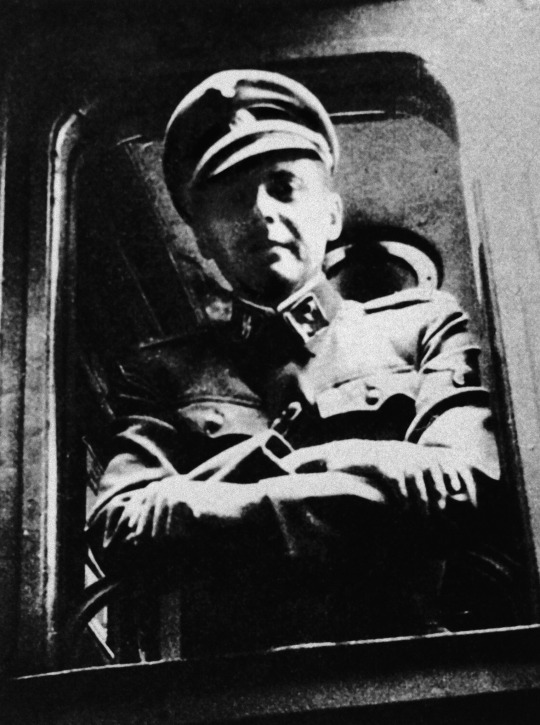
“The moment has come to make good a promise I gave. I must substantiate why, according to my firm conviction, torture was the essence of National Socialism - more accurately stated, why it was precisely in torture that the Third Reich materialized in all the density of its being. That torture was, and is, practiced elsewhere has already been dealt with. Certainly. In Vietnam since 1964. Algeria 1957. Russia probably between 1919 and 1953. In Hungary in 1919 the Whites and the Reds tortured. There was torture in Spanish prisons by the Falangists as well as the Republicans. Torturers were at work in the semifascist Eastern European states of the period between the two World Wars, in Poland, Romania, Yugoslavia. Torture was no invention of National Socialism. But it was its apotheosis. The Hitler vassal did not yet achieve his full identity if he was merely as quick as a weasel, tough as leather, hard as Krupp steel. No Golden Party Badge made of him a fully valid representative of the Führer and his ideology, nor did any Blood Order or Iron Cross. He had to torture, destroy, in order to be great in bearing the suffering of others. He had to be capable of handling torture instruments, so that Himmler would assure him his Certificate of Maturity in History; later generations would admire him for having obliterated his feelings of mercy.
Again I hear indignant objection being raised, hear it said that not Hitler embodied torture, but rather something unclear, "totalitarianism." I hear especially the example of Communism being shouted at me. And didn't I myself just say that in the Soviet Union torture was practiced for thirty-four years? And did not already Arthur Koestler . . . ? Oh yes, I know, I know. It is impossible to discuss here in detail the political "Operation Bewilderment" of the postwar period, which defined Communism and National Socialism for us as two not even very different manifestations of one and the same thing. Until it came out of our ears, Hitler and Stalin, Auschwitz, Siberia, the Warsaw Ghetto Wall and the Berlin Ulbricht-Wall were named together, like Goethe and Schiller, Klopstock and Wieland. As a hint, allow me to repeat here in my own name and at the risk of being denounced what Thomas Mann once said in a much attacked interview: namely, that no matter how terrible Communism may at times appear, it still symbolizes an idea of man, whereas Hitler-Fascism was not an idea at all, but depravity. Finally, it is undeniable that Communism could de-Stalinize itself and that today in the Soviet sphere of influence, if we can place trust in concurring reports, torture is no longer practiced. In Hungary a Party First Secretary can preside who was himself once the victim of Stalinist torture. But who is really able to imagine a de-Hitlerized National Socialism and, as a leading politician of a newly ordered Europe, a Röhm follower who in those days had been dragged through torture? No one can imagine it. It would have been impossible. For National Socialism - which, to be sure, could not claim a single idea, but did possess a whole arsenal of confused, crackbrained notions - was the only political system of this century that up to this point had not only practiced the rule of the antiman, as had other Red and White terror regimes also, but had expressly established it as a principle. It hated the word "humanity" like the pious man hates sin, and that is why it spoke of "sentimental humanitarianism." It exterminated and enslaved. This is evidenced not only by the corpora delicti, but also by a sufficient number of theoretical confrmations. The Nazis tortured, as did others, because by means of torture they wanted to obtain information important for national policy. But in addition they tortured with the good conscience of depravity. They martyred their prisoners for definite purposes, which in each instance were exactly specified. Above all, however, they tortured because they were torturers. They placed torture in their service. But even more fervently they were its servants.” - Jean Améry, ‘At the Mind's Limits: Contemplations by a Survivor on Auschwitz and Its Realities’ (1966) [pages 30, 31]
#amery#améry#jean amery#jean améry#at the mind’s limits#third reich#wwii#holocaust#torture#fascism#hitler#mengele
5 notes
·
View notes
Text
i can't even begin to imagine how wael al-dahdouh feels this is worse than death this is the most painful fate imaginable!! just watching all his family and loved ones die one after another how can they be so cruel?!!
#i keep thinking i know the heights of their villainy but they keep breaching that limit and suprising me!#i can't imagine the weight of so much grief. my mind breaks trying to think about this.#who even remains in his family??
10K notes
·
View notes
Text
theres a million blogs these days with names like "puppygirl-macrobulge" and "netflix-for-girl-balls" and whatnot who make 150 posts a day like "theyre all out of 'piss from a girl who's been holding it in all day playing factorio' at trader joes, whats the fcuking point of it all" and i gotta say, i didnt expect that to be its entire own genre of posting in the 2020s.
#text#random thought#i dont think i could be this kind of poster. i dont know that i have it in me#i wouldnt mind being one of the girls they post ABOUT though#'ive got to huff the thigh sweat of a businesswoman who's been in stressful meetings for the past 4 hours'#like sure girl go ahead im whooped from those meetings anyway#but im limiting you to 3 posts about this
7K notes
·
View notes
Text
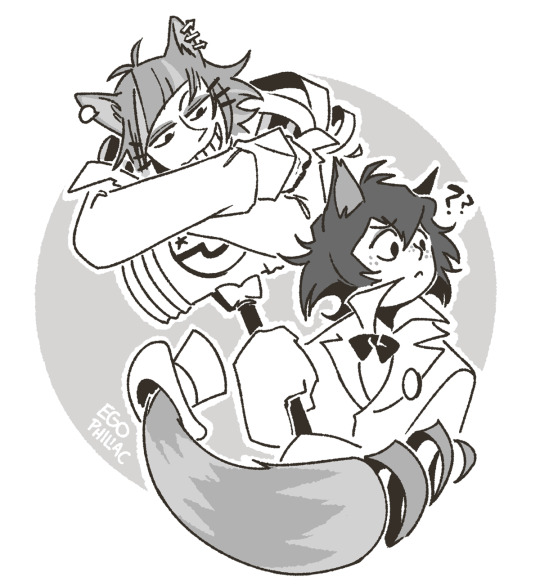


messing around with techniques! I...like the foxman and the catboy a lot okay
also, a couple of quickies that honestly don't deserve any more effort than I've already given them:

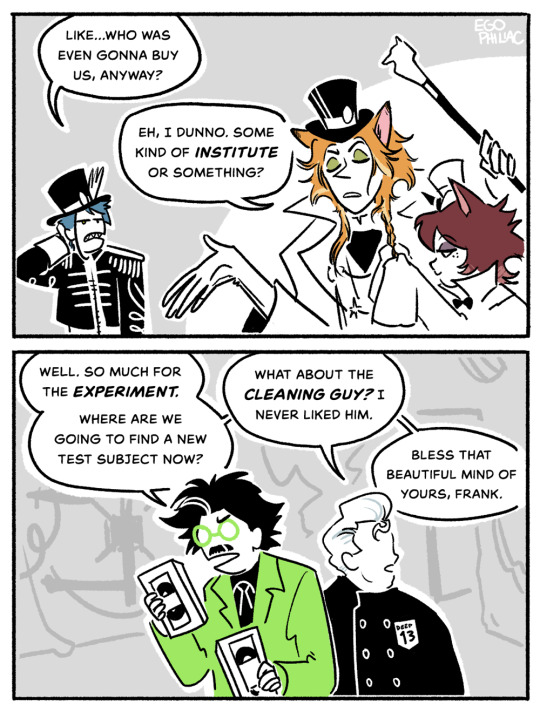
#art#twisted wonderland#twisted wonderland spoilers#stage in playful land#stage in playfulland#smoking#i mean i assume they evacuated everyone else in addition to the nrc boys#i ASSUME...#look my mind is just gonna be fellow and gidel central until we find out what's happening in december#me as i feverishly pin up red string on my corkboard: okay obviously the first thing will be rook's birthday but then...THEN...#this is twst so it could be anything from 'here is the rest of episode 7 all at once immediately and with 20 limited ssr pickups'#to 'uhhhhhh idk how about a (throws dart at dartboard) beans day rerun with no changes except now (fishes paper out of hat) trey has a card#tis the season for BEANS
4K notes
·
View notes
Text
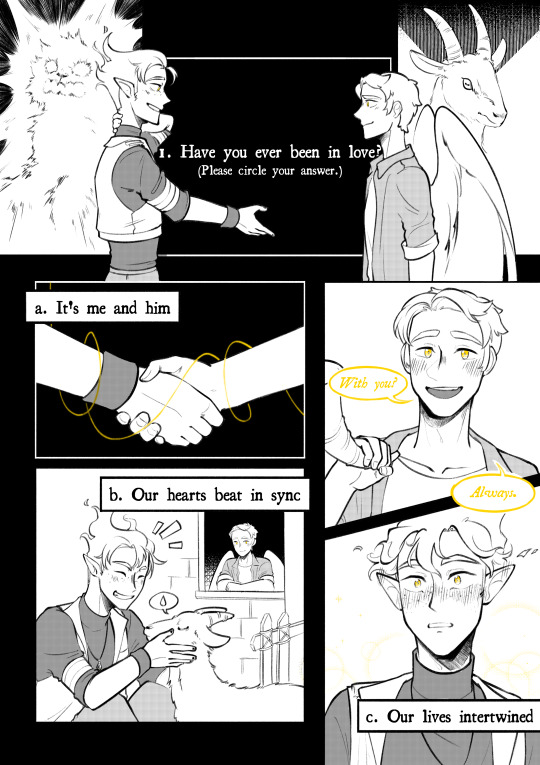
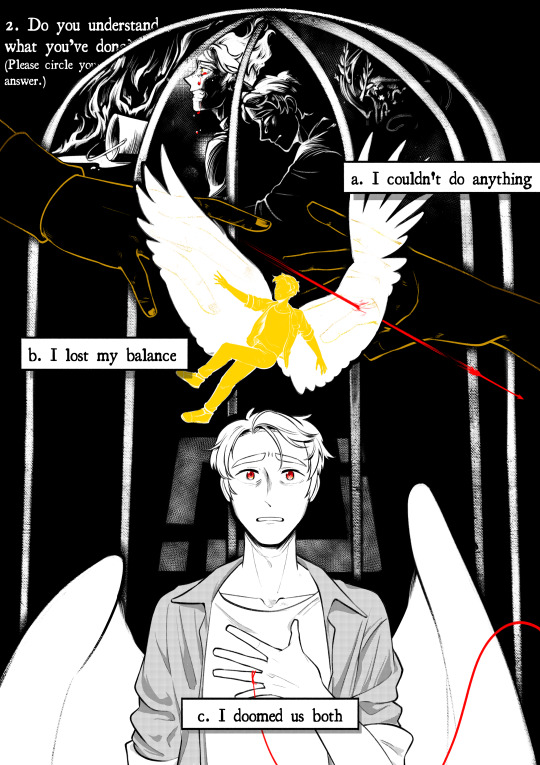

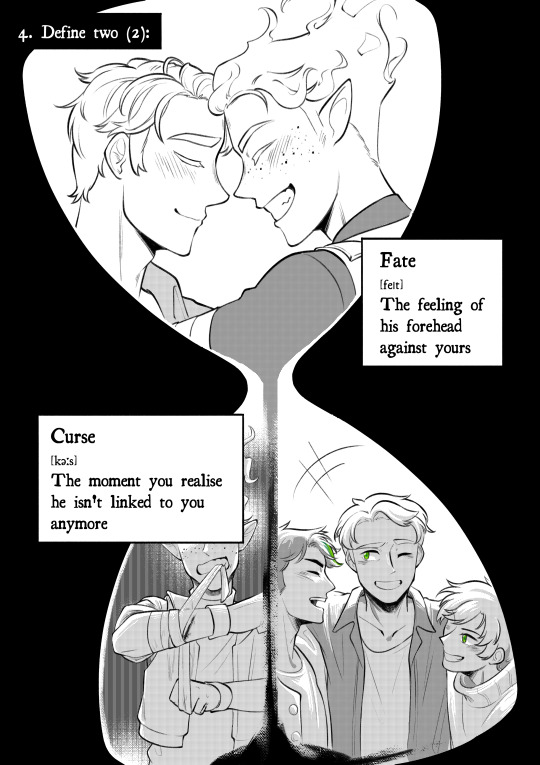
You have 90 minutes to complete. (original poem: r.a.)
In participation of the MCYT Recursive Exchange 2024 hosted by @mcytrecursive!
Inspired by know that all my love will be your breath (i will save you when your lights go out)
[text under cut]
1. Have you ever been in love?
(Please circle your answer.)
a. It's me and him
b. Our hearts beat in sync
c. Our lives intertwined
2. Do you understand what you’ve done?
(Please circle your answer.)
a. I couldn't do anything
b. I lost my balance
c. I doomed us both
3. It's been god knows how long since you felt phantom hands on your neck and there is no one in sight. If you were soul-bound to him and both of you died at the same time then why are you still waiting in the void?
Please answer clearly, in full sentences.
(Not a correct answer:I just wanted to see him one more time).
4. Define two (2):
Fate | The feeling of his forehead against yours
Curse | The moment you realise he isn't linked to you anymore
5. True or False:
i. It was your fault.
ii. You wish you had met him under different circumstances.
iii. You can’t regret a single moment that you had him.
iv. You would do it all over again if you could.
v. It ended long before either of you said anything.
thumbnails:

sketch cover thing for imgur link:

#team ranchers#team rancher#rancher duo#jimmy solidarity#tangotek#trafficshipping#mcyt recursive exchange#events#fic fanart#my art#“canary has butterfly-shaped wings it cant do a dramatic spread like that” watch me. (draws dramatic wings) (sorry)#“you have 90 minutes” have been rattling in my brain for so long ever since i suddenly remembering a web weave using it (yes the beeduo one#very glad i can release it (using it in art) from its confines (my mind)#hm i suppose the title would be more in theme if its abt limited life ranchers#← havnt watched limlife yet#but! happy with what i come up with. lil bit proud even#had so much trouble with the panelling and layers in p2 cause it looks too busy (explodes)#also punching the floor bc i only noticed the “yes-no” pair(?) in the original poem when im already half-done w/ the comic#me when making silly comic makes you do poem analysis#i dont even go there ← does not have enough poetic braincells
2K notes
·
View notes
Text
Sorry, your boyfriend got reincarnated. Yeah, he doesn’t remember that time you murdered him with your bare hands. He doesn’t know how much you love him. He doesn’t know that you’ve killed for him. He doesn’t know that you’ve killed him. He doesn’t know it’ll happen again. As he takes your hand and your heart, and you laugh from atop an animal the two of you ride together, he doesn’t know you’ve been here before. He doesn’t know it’ll happen again.
#in order we got: llama. horse. panda? llama. camel#sorry for trafficshipping it’ll happen again#scarian#hermitshipping#<- ig??#idk they’re /p in my mind but I have no way to justify that lmao#traffic series#life series#third life#last life#double life#limited life#secret life#grian#goodtimeswithscar#nerdy’s traffic analysis#poetry#?
4K notes
·
View notes
Text

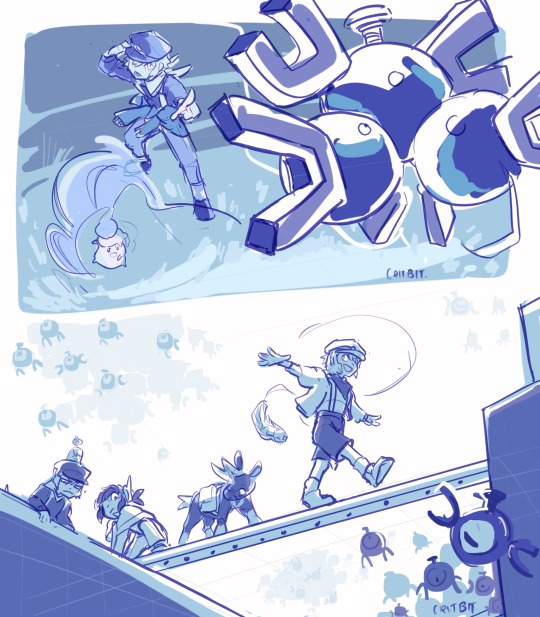
The kids visit the Virbank Complex during the biyearly magnemite migration!
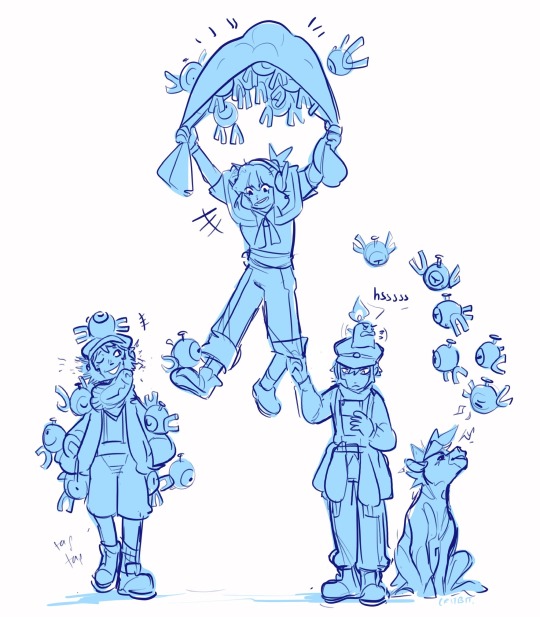
Much like thirteen year olds left to their own devices, the nimbasa trio can and will get into shit like raccoons into trash.
Masterpost
#litwick slays btw#steel types fear her#flame burst goes bRrrr#pokemon#art#sketchbook#myart#submas#fanart#pokemon ingo#pokemon emmet#pokemon elesa#ingo#emmet#elesa#litwick#tynamo#blitzle#nimbasa trio#dont mind me haha im experimenting with limited color pallets#virbank complex#pokemon bw#bw2#magnemite#magneton#shenanigans#based off real time gameplay as I get harassed by hundreds of magnets
3K notes
·
View notes
Text
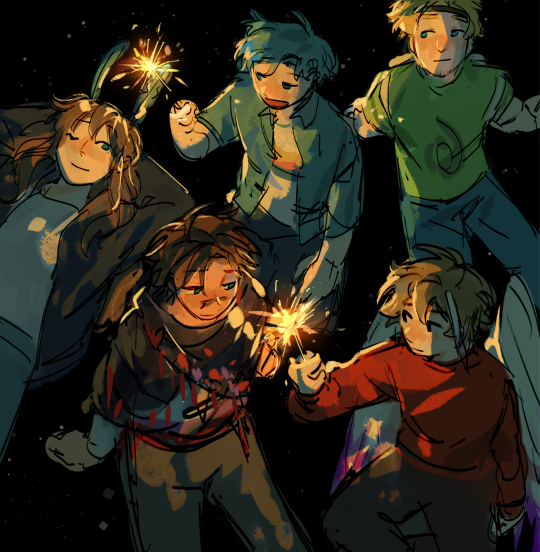
To chase away any bad luck
Happy new year🎇
#dddaily4sherin#day 187!#i posted the wip on twt before midnight in my timezone but forgot to post here BHAHSHA#grian#scott smajor#pearlescentmoon#inthelittlewood#goodtimeswithscar#life series#trafficblr#traffic smp#they in the void. I've always wanted to do this#dont mind the absolutely broken perspective look i had limited time HSFJAHD HEAD IN HANDS#happy new year!! :D#my art
2K notes
·
View notes
Text


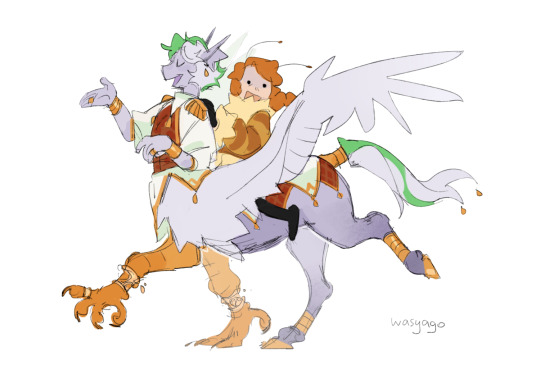

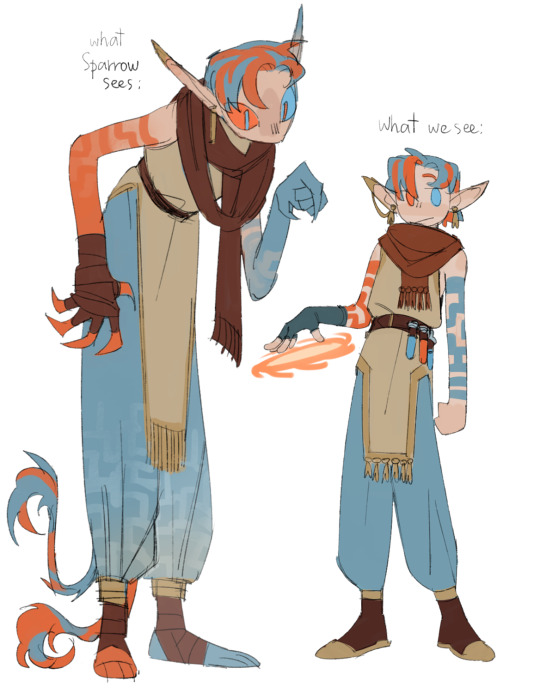
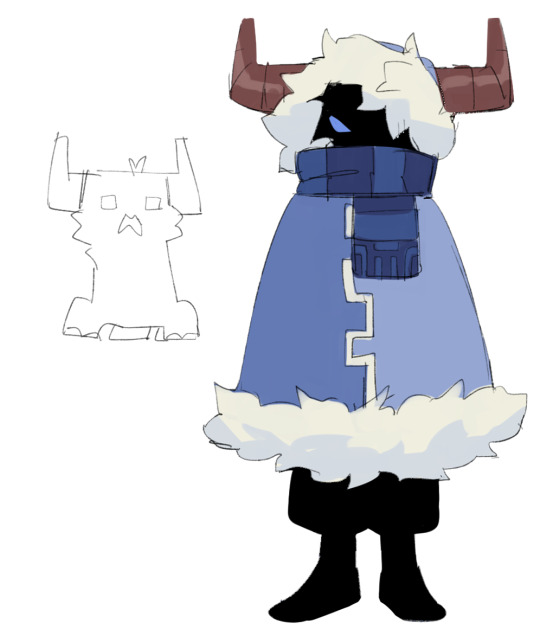
the brainrot won
#GUY S i know i haven't posted anything in a while and thats because im working on a big cool project that i really want to finish without-#distractions. but uh. as you can see. ive been distracted 😔. still working on it tho!!!! and im very happy with it turns out its just-#super time and energy consuming so ive tried to limit my intake of other media to not make myself want to draw other stuff#i also haven't read the last two (two already?????) chapters of RnS and im very sad about it and i want to read it but you know that if i-#read it ill want to make fanart and then ill never finish my project :(#SO. sorrey for the lack of art itll be coming when im free to draw!!!!!!!#but also. yes ive watched new life because i dont want to go insane with nothing but this project on my mind and umm. had to take a little-#break to do a couple designs for fun... and to switch it up a bit because for real im going insane i think#ALSO. friend got me into zelda botw and i haven't played a whole lot yet (because project) but ive tried to take some inspiration for-#designs from there. at least for joel and scott. everyone else not so much...#WELL ANYWAYS this is getting long. i should really stop rambling in the tags and just make separate posts for all this but i dont want to#umm. tags.#new life smp#smallishbeans#mythical sausage#geminitay#pearlescentmoon#smajor1995#inthelittlewood#my art#sketch
4K notes
·
View notes
Text






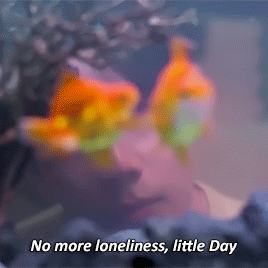









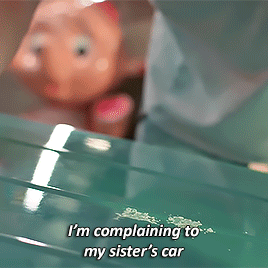








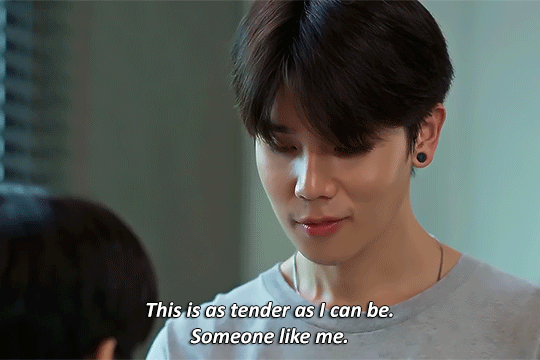
I haven't got a job. Why not? I think they only want clean people. They haven't taken that thing off yet? It's gone. But I guess some people still see it.
#if you take anything away from this let it be that it's not just with day#mhok is just very tender in general#i've spent far too long on this#had to remove some moments even#because i hit the upload limit#he's a far far more caring and tender person than he gives himself credit for#it bursts through every interaction he has#even the very first fight that landed him in jail#not in the best way mind you#was him defending a friend#but still#last twilight#last twilight series#kk.gifs#pdribs#uservid
2K notes
·
View notes
Text
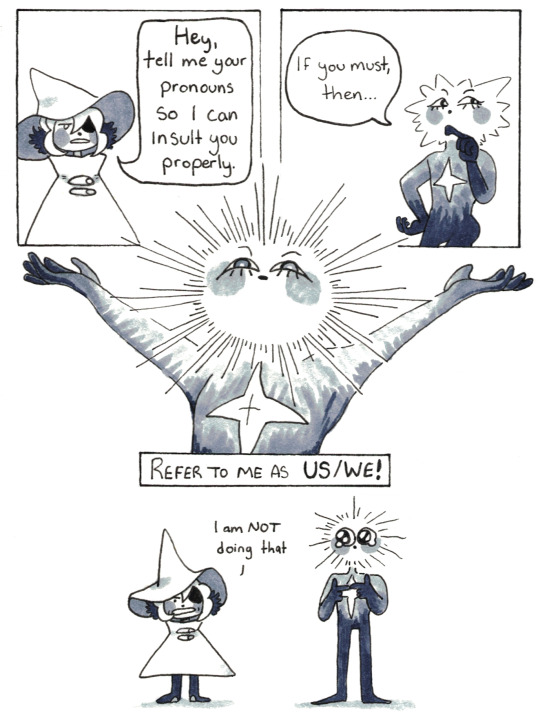
Reasons to play In Stars and Time: Canon Pronoun Warfare.
#in stars and time#ISAT#Siffrin#Loop#Context: early on you meet a character who tries to get you to use the royal We pronoun for them and you shut them down. It's great.#The gender swag and non-binary rep in this game is lovely.#I sketched this out when I was in Act 2 - and as of posting this I have not yet finished the game so *please* no spoilers.#It is rare for me to get into something spoiler free and I have been getting my shit rocked by this game in the best way.#Yes I *am* taking another detour to talk about a video game I love again. I will have some fun crossovers. Trust the process.#I will also do my best to pitch this game as spoiler free as possible. Because you *should* play this game:#ISAT is a very lovingly crafted RPG with very fun and emotional writing.#The characters are great and the mysteries you slowly uncover are intriguing!#The way the gameplay ties into the player's own emotional state is nearly always in sync with the protagonist. You *will* feel things.#And it is not afraid to let those things be hard emotions! Do mind the content warnings and know your limits though.#As someone who sucks at video games I also appreciate that it is so generous with your time and keeps things fun.#Not to mention it is honestly underpriced for the amount of content in it. Buy this game. I need to spread the brainworms.
701 notes
·
View notes
Text
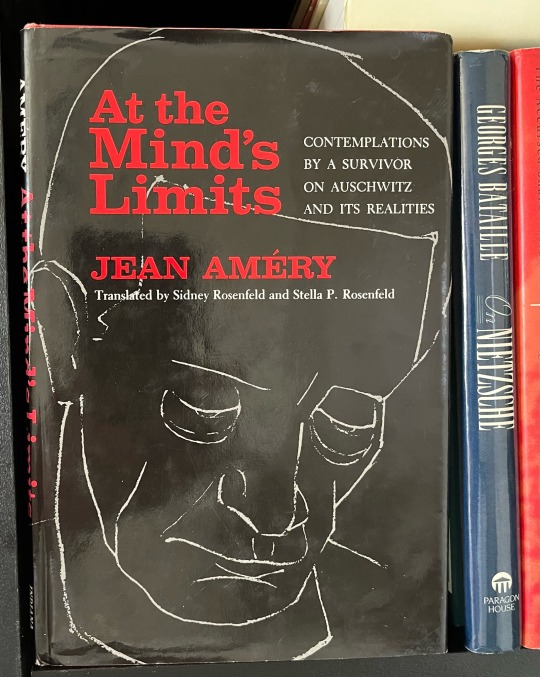
“What, for example, was the attitude of the intellectual in Auschwitz toward death? A vast, unsurveyable topic, which can be covered here only fleetingly, in double time! I will assume it is known that the camp inmate did not live next door to, but in the same room with death. Death was omnipresent. The selections for the gas chambers took place at regular intervals. For a trifle prisoners were hanged on the roll call grounds, and to the beat of light march music their comrades had to file past the bodies - Eyes right! - that dangled from the gallows. Prisoners died by the score, at the work site, in the infirmary, in the bunker, within the block. I recall times when I climbed heedlessly over piled-up corpses and all of us were too weak or too indifferent even to drag the dead out of the barracks into the open. But as I have said, people have already heard far too much about this; it belongs to the category of the horrors mentioned at the outset, those which I was advised with good intentions not to discuss in detail.
Here and there someone will perhaps object that the front-line soldier was also constantly surrounded by death and that therefore death in the camp actually had no specific character and posed no incomparable ques: tions. Must I even say that the analogy is false? Just as the life of the front-line soldier, however he may have suffered at times, cannot be compared with that of the camp inmate, death in battle and the prisoner's death are two incommensurables. The soldier died the hero's or victim's death, the prisoner that of an animal intended for slaughter. The soldier was driven into the fire, and it is true that his life was not worth much. Still, the state did not order him to die, but to survive. The final duty of the prisoner, however, was death. The decisive difference lay in the fact that the front-line soldier, unlike the camp inmate, was not only the target, but also the bearer of death. Figuratively expressed: death was not only the ax that fell upon him, but it was also the sword in his hand. Even while he was suffering death, he was able to inflict it. Death approached him from without, as his fate, but it also forced its way from inside him as his own will. For him death was both a threat and an opportunity, while for the prisoner it assumed the form of a mathematically determined solution: the Final Solution! These were the conditions under which the intellectual collided with death. Death lay before him, and in him the spirit was still stirring; the latter confronted the former and tried - in vain, to say it straight off - to exemplify its dignity.
The first result was always the total collapse of the esthetic view of death. What I am saying is familiar. The intellectual, and especially the intellectual of German education and culture, bears this esthetic view of death within him. It was his legacy from the distant past, at the very latest from the time of German romanticism. It can be more or less characterized by the names Novalis, Schopenhauer, Wagner, and Thomas Mann. For death in its literary, philosophic, or musical form there was no place in Auschwitz. No bridge led from death in Auschwitz to Death in Venice. Every poetic evocation of death became intolerable, whether it was Hesse's "Dear Brother Death" or that of Rilke, who sang: "Oh Lord, give each his own death." The esthetic view of death had revealed itself to the intellectual as part of an esthetic mode of life; where the latter had been all but forgotten, the former was nothing but an elegant trifle. In the camp no Tristan music accompanied death, only the roaring of the SS and the Kapos. Since in the social sense the death of a human being was an occurrence that one merely registered in the so-called Political Section of the camp with the set phrase "subtraction due to death," it finally lost so much of its specific content that for the one expecting it, its esthetic embellishment in a way became a brazen demand and, in regard to his comrades, an indecent one.
After the esthetic view of death crumbled, the intellectual faced death defenselessly. If he attempted nonetheless to establish an intellectual and metaphysical relationship to it, he ran up against the reality of the camp, which doomed such an attempt to failure. How did it work in practice? To put it briefly and tritely: just like his unintellectual comrade, the intellectual inmate did not occupy himself with death, but with dying. Then, however, the entire problem was reduced to a number of concrete considerations. For example, there was once a conversation in the camp about an SS man who had slit open a prisoner's belly and filled it with sand. It is obvious that in view of such possibilities one was hardly concerned with whether, or that, one had to die, but only with how it would happen. Inmates carried on conversations about how long it probably takes for the gas in the gas chamber to do its job. One speculated on the painfulness of death by phenol injections. Were you to wish yourself a blow to the skull or a slow death through exhaustion in the infirmary? It was characteristic for the situation of the prisoner in regard to death that only a few decided to "run to the wire," as one said, that is, to commit suicide through contact with the highly electrified barbed wire. The wire was after all a good and rather certain thing, but it was possible that in the attempt to approach it one would be caught first and thrown into the bunker, and that led to a more difficult and more painful dying. Dying was omnipresent, death vanished from sight.
Now of course, no matter where you are, the fear of death is essentially the fear of dying, and Franz Borkenau's claim that the fear of death is the fear of suffocation holds true also for the camp. For all that, if one is free it is possible to entertain thoughts of death that at the same time are not also thoughts of dying, fears of dying. Death in freedom, at least in principle, can be intellectually detached from dying: socially, by infusing it with thoughts of the family that remains behind, of the profession one leaves, and mentally, through the effort, while still being, to feel a whiff of Nothingness. It goes without saying that such an attempt leads nowhere, that death's contradiction cannot be resolved. Still, the effort contains its own intrinsic dignity: the free person can assume a certain spiritual posture toward death, because for him death is not totally absorbed into the torment of dying. The free person can venture to the out most limit of thought, because within him there is still a space, however tiny, that is without fear. For the prisoner, however, death had no sting, not one that hurts, not one that stimulates you to think. Perhaps this explains why the camp inmate and it applies equally to the intellectual as well as to the unintellectual did experience agonizing fear of certain kinds of dying, but scarcely an actual fear of death. If I may speak of myself, then let me assert here that I never considered myself to be especially brave and probably also am not. Yet, when they once fetched me from my cell after I already had a few months of punitive camp behind me and the SS man gave me the friendly assurance that now I was to be shot, I accepted it with perfect equanimity. "Now you're afraid, aren't you?" the man - who was just having fun - said to me. "Yes," I answered, but more out of complaisance and in order not to provoke him to acts of brutality by disappointing his expectations. No, we were not afraid of death. I clearly recall how comrades in whose blocks selections for the gas chambers were expected did not talk about it, while with every sign of fear and hope they did talk about the consistency of the soup that was to be dispensed. The reality of the camp triumphed effortlessly over death and over the entire complex of the so-called ultimate questions. Here, too, the mind came up against its limits.
All those problems that one designates according to a linguistic convention as "metaphysical" became meaningless. But it was not apathy that made contemplating them impossible; on the contrary, it was the cruel sharpness of an intellect honed and hardened by camp reality. In addition, the emotional powers were lacking with which, if need be, one could have invested vague philosophic concepts and thereby made them subjectively and psychologically meaningful. Occasionally, perhaps that disquieting magus from Alemannic regions came to mind who said that beings appear to us only in the light of Being, but that man forgot Being by fixing on beings. Well now, Being. But in the camp it was more convincingly apparent than on the outside that beings and the light of Being get you nowhere. You could be hungry, be tired, be sick. To say that one purely and simply is, made no sense. And existence as such, to top it off, became definitively a totally abstract and thus empty concept. To reach out beyond concrete reality with words became before our very eyes a game that was not only worthless and an impermissible luxury but also mocking and evil. Hourly, the physical world delivered proof that its insufferableness could be coped with only through means inherent in that world. In other words: nowhere else in the world did reality have as much effective power as in the camp, nowhere else was reality so real. In no other place did the attempt to transcend it prove so hopeless and so shoddy. Like the lyric stanza about the silently standing walls and the flags clanking in the wind, the philosophic declarations also lost their transcendency and then and there became in part objective observations, in part dull chatter. Where they still meant something they appeared trivial, and where they were not trivial they no longer meant anything. We didn't require any semantic analysis or logical syntax to recognize this. A glance at the watchtowers, a sniff of burnt fat from the crematories sufficed.” (pages 15 - 19)
#amery#améry#jean amery#jean améry#at the mind’s limits#aushwitz#naziism#wwii#holocaust#bataille#georges bataille#nietzsche#books#bookshelf#library
2 notes
·
View notes
Text
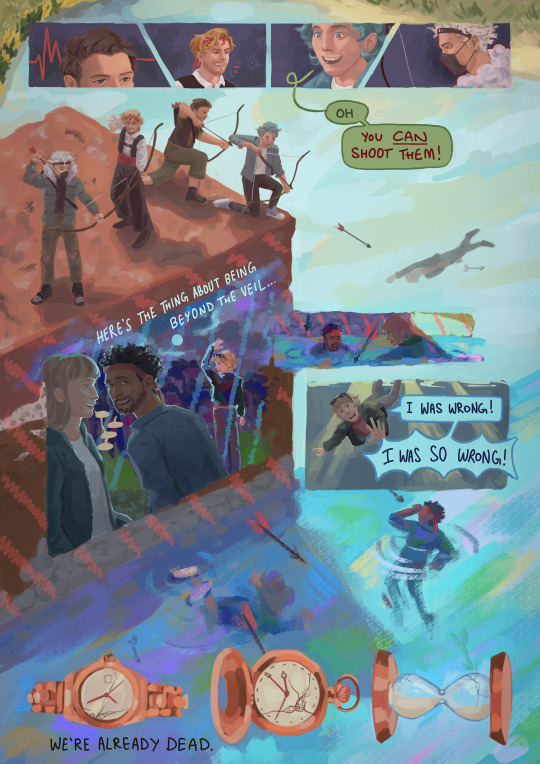
I wasn't actually planning on posting my traffic zine piece, but after seeing martyn react to (most of, hopefully he does the unread fics another time) the zine, I'll post it here :D @trafficzine
This was so much fun, even if i had to super rush it because of IRL things!
#limited life#limited life smp#trafficblr#pearlescentmoon#bigbst4tz2#inthelittlewood martyn#art out the oven#this was sooo rushed but i wouldn't have made a piece to this scale otherwise so i'm happy about it#i don't think the actual past the barrier concept i had in mind was executed as well as i wanted it to but oh well!#i had fun! and everyone else's pieces are incredible and a treat to read and see#[scheduled]
2K notes
·
View notes
Text
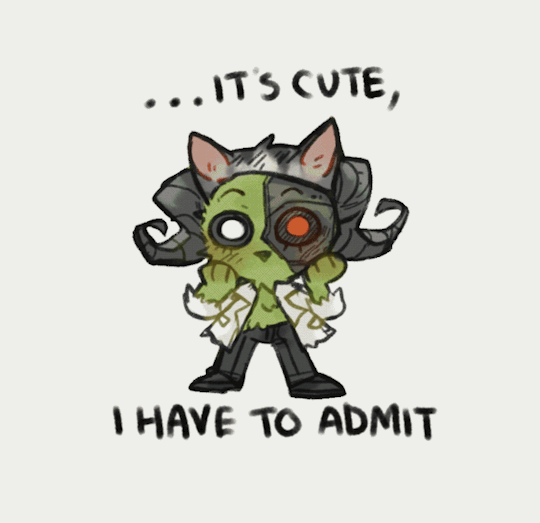
At least docm’s inevitable merciless rampage will serve as excellent Scarland promotional material 😌
#docm fanart#docm77#hermitblr#hermitcraft#the incident#hermitcraft s9#myart#fanart#hewwo I’ve been terribly busy and largely unable to draw for pleasure lately due to wrist pain oTL#but rest assured that I am fully caught up on limited life and hermitcraft s9 and losing my MIND#anyways can’t believe Catboi DocM is what finally convinced me to pick up a pen and make some fanart
3K notes
·
View notes
Note
BIRD SSR????????????
NOOOO I wasted all my keys on Platinum Malleus, HOW CAN THEY DO THIS TO ME
(I do kinda love that this is officially "Raven Jacket" Crowley though) (does this open up the possibility of a selection of future Crowley fashion cards)
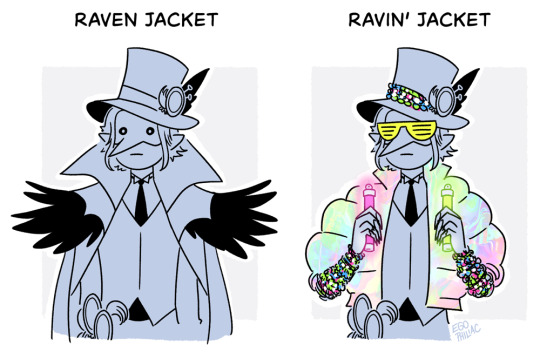
#art#twisted wonderland#twisted wonderland spoilers#eyestrain#(my knowledge of rave attire is very limited i am so sorry)#(to be fair i don't believe crowley knows anything about raving either)#(he's there in a misguided attempt to chaperone/make sure students don't do anything he might be legally liable for)#petition for an ssr of crowley's beach shorts and fedora#anyway i saw the banner and immediately assumed it was going to be another absolutely unhinged no-context episode 7 story card drop#and lost my MIND#and then i scrolled down and...oh it's an event whoops#alas another month without more main story#does this mean more staff cards in the future though? HEY TWST DOES THIS MEAN MORE STAFF CARDS 👀👀👀#are they going to have stories. do we get to see crowley try once again to convince the school board not to fire him. yes PLEASE#god i have NO keys what am i going to DO#i thought i had time to save for sebek's birthday!#but...but our terrible birddad...
2K notes
·
View notes
Text



some martyn looks... he serves in every outfit he's ever worn i don't know what to tell you
#hes been on my mind a lot lately. i have so many art ideas and thoughts in my skull#martyn littlewood#inthelittlewood#traffic smp#trafficblr#life series#lifeseries#3rd life#third life#last life#limited life#art tag
597 notes
·
View notes